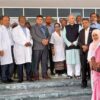MBBS in India is one of the highly preferred courses by medical aspirants across the world. Strong educational structure, dedicated professors and outstanding medical universities in India pave the way for success. To secure admission into MBBS courses in India, aspirants are required to appear in NEET. The healthy and peaceful environment in India helps students to gain knowledge more quickly. MBBS in India requires a student to score at least 50% in 10+2 exams.
Duration of MBBS courses in India is 5.5 years. The first 4.5 years are devoted to classroom training, the remainder to an internship course. If you are considering a MBBS degree from a recognized university, India is a great option. WHO, NMC, and UNESCO approves all top medical colleges in India. To apply for MBBS courses in India, applicants are advised to keep an eye on important dates. In India, the academic year for MBBS courses begins in September or October and students can start applying in June and July.
The course syllabus is divided into 9 broad semesters where you will be taught subjects such as anatomy, pediatrics, pathology, physiology, biochemistry, community medicine, surgery and many others. In the hospital and pharmaceutical sector, there are ample employment opportunities for MBBS students.
Other career options after pursuing an MBBS can be postgraduate or doctoral studies such as a master’s degree (MS) course or a doctoral degree in medicine (MD). The competition in this course is also very fierce, so students should have a passion for taking this course otherwise it will not be easy to survive in this field.
MBBS Colleges in India: Available Options
MBBS is a general undergraduate course in medical science that all applicants seeking to become doctors must pursue. There is no option for any specialization here, but there are various specialties available at the graduate level for applicants to choose from: –
S.no. Specialization
- General Medicine
- Ophthalmology
- General Surgery
- Orthopaedics
- Dermatology
- Anaesthesiology
- Psychiatry
- Radiology
- Internal Medicine
- Family Medicine
- Chest Medicine
- Paediatrics
- Obstetrics & Gynaecology
- ENT (Ear, Nose and Throat)
MBBS in India – Important info.
S.no. Description Details
- Intake September
- Minimum percentage 60% in PCB for General 40% for SC/ ST and Reserve Categories
- NEET As per qualification and cut – off
- Processing duration 45 – 60 Days
- Minimum Fees ₹ 7,00,000 Per Year (Pvt. Colleges)
- Maximum Fees ₹ 25,00,000 Per Year (Pvt. Colleges)
- Hostel Fee etc ₹ 10500 to ₹ 20,000 Per Month
- Course Duration 4.5 Years
- Language English, Hindi & regional
- Recognition WHO, NMC & UNESCO approved
MBBS in India – Eligibility Criteria
Before applying for a course, you should first see the eligibility requirements to be eligible for that course. Each course has its various qualification requirements according to requirements.
Below are some of the requirements you need to meet to be admitted to MBBS College/University in India
Students should have cleared 10 + 2 from an approved board with subjects such as physics, chemistry, biology with at least a 50% grade and English as a core subject in an aptitude test. However, for a reserved category, the minimum level requirement is 40%
The lower age limit for a student should be 17 years while applying for the MBBS course. The student should not be younger than this age; otherwise their intake is out of the question. The upper age limit for a student should be 25 years
The student must meet the additional eligibility criteria mentioned by the NMC for MBBS
The entrance exams mentioned below should be cleared before joining MBBS

MBBS in India – Admission Process
For admission into the best medical colleges for MBBS, you must first meet the above eligibility criteria and, secondly, attend entrance exams which are conducted at the state or national level. Therefore, it is necessary to pass the exams to get a place in MBBS. Therefore, this step to pass the oral examination is mandatory and it is the first step towards the oral examination. You cannot go on without this.
After passing the 10+2 if you want to get an MBBS, you will need to focus on the basic entrance exam that is applicable in most states and universities. The exam is called ‘NEET’, which is a short form of National Eligibility cum Entrance Examination. Apart from this, there are also two other exams which are combined with NEET.
All private, state, central and reputable universities are all accessed on the basis of NEET Score. MBBS seats are allotted through counseling based on merit list placement, wishes and seat availability. In India, there are 500+ medical colleges with 105,000+ available seats. If we talk about AIIMS, in its 15 campuses in India including the main campus in New Delhi, it offers about 1500+ seats and JIPMER provides 200 seats in Puducherry and Karaikal campuses when you take your entrance exams.
Why MBBS in India
Medical universities in India are some of the finest in the world
There are over 540 medical universities and colleges in India. Out of these, 290+ are private colleges.
There are more than 105,000+ seats available in India
MBBS in India is ranked higher due to its excellence in research and training programs
Indian medical colleges provide excellent clinical knowledge and expertise
Students have the advantage of attending international seminars and conferences
Global standard syllabus is followed in Indian medical colleges
Students are free to practice in any part of the world after MBBS from India




